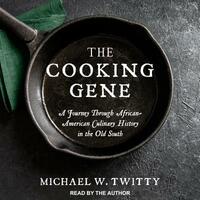Take a photo of a barcode or cover
538 reviews for:
The Cooking Gene: A Journey Through African-American Culinary History in the Old South
Michael W. Twitty
538 reviews for:
The Cooking Gene: A Journey Through African-American Culinary History in the Old South
Michael W. Twitty
I expected something a bit better organized and more cultural history than personal memoir.
challenging
emotional
informative
reflective
slow-paced
Graphic: Racism, Slavery, Grief
Moderate: Death of parent
slow-paced
Listen, I read/listened to 75% of this book and I think it should count as full credit. Super interesting premise and really important history. But I cannot make myself finish it.
informative
fast-paced
challenging
informative
slow-paced
<blockquote> It is no sin to go back and fetch what you have forgotten. </blockquote>
Twitty ends his book with the above Twi proverb, which seems fitting.
This was my January book for the 12 Challenge (12 months to read 12 books recommended by 12 friends). I read it first instead of during Black History Month simply because it was the first book of the 12 available from my library.
I'm not sure I knew what to expect when I picked up this book. And I'm not sure this book met whatever expectations I may have had.
This is a complex and dense book. Because this book is a "nonfiction narrative intended to weave together elements of genealogical documentation, genealogy, first-hand accounts from primary sources, the most recent findings of culinary and cultural historians, and personal memoir," it takes time to read and unpack [quote from the Author's Note]. I found myself reading a chapter or section and then would let the book sit for a bit whilst I ruminated on what I read.
In my own words, the Cooking Gene is Twitty's exploration of his identity, both culturally and racially, through the lens of historical cooking and ancestry exploration. He is trying to find his cooking "gene."
In other words, there's a lot here. And I thank Michael Twitty for sharing his journey with us. It's clear that Twitty is passionate and knowledgeable about historic culinary practices.
That being said, I had maybe expected a more traditionally linear story rather than jumping from past to present to past to near present. I found it hard to stay with him, and that's even doing a slow read. The parts about food and cooking are not what I had expected. That didn't make those parts less interesting, but I found myself often with more questions than answers on the cooking bits. There were mentions of places or historical people without a lot of context, and so I found myself googling names, events, places every few paragraphs, which disrupted the flow of the narrative. I also found the extremely detailed account of Twitty's genealogical searches, including about 20 pages just detailing his various DNA reports, bogging down the flow. Yes, some of this was important to the themes and ideas Twitty is expressing, but I think a more succinct summary may have helped the narrative flow.
Despite that, I did find many moments of brilliance, crucial information being relayed about slavery and genealogy, and reminders that race in America needs to be discussed more openly and taught more accurately at school. This book definitely made me think about the dishes I loved growing up in the South and how and why these dishes came to be associated with "southern cooking" and who has taken credit for these southern dishes and who really should be given credit for these dishes.
Despite giving it 3.5 stars, I would recommend it. But be prepared, this is a book that takes time to read and will involve the frequent use the google.
Twitty ends his book with the above Twi proverb, which seems fitting.
This was my January book for the 12 Challenge (12 months to read 12 books recommended by 12 friends). I read it first instead of during Black History Month simply because it was the first book of the 12 available from my library.
I'm not sure I knew what to expect when I picked up this book. And I'm not sure this book met whatever expectations I may have had.
This is a complex and dense book. Because this book is a "nonfiction narrative intended to weave together elements of genealogical documentation, genealogy, first-hand accounts from primary sources, the most recent findings of culinary and cultural historians, and personal memoir," it takes time to read and unpack [quote from the Author's Note]. I found myself reading a chapter or section and then would let the book sit for a bit whilst I ruminated on what I read.
In my own words, the Cooking Gene is Twitty's exploration of his identity, both culturally and racially, through the lens of historical cooking and ancestry exploration. He is trying to find his cooking "gene."
In other words, there's a lot here. And I thank Michael Twitty for sharing his journey with us. It's clear that Twitty is passionate and knowledgeable about historic culinary practices.
That being said, I had maybe expected a more traditionally linear story rather than jumping from past to present to past to near present. I found it hard to stay with him, and that's even doing a slow read. The parts about food and cooking are not what I had expected. That didn't make those parts less interesting, but I found myself often with more questions than answers on the cooking bits. There were mentions of places or historical people without a lot of context, and so I found myself googling names, events, places every few paragraphs, which disrupted the flow of the narrative. I also found the extremely detailed account of Twitty's genealogical searches, including about 20 pages just detailing his various DNA reports, bogging down the flow. Yes, some of this was important to the themes and ideas Twitty is expressing, but I think a more succinct summary may have helped the narrative flow.
Despite that, I did find many moments of brilliance, crucial information being relayed about slavery and genealogy, and reminders that race in America needs to be discussed more openly and taught more accurately at school. This book definitely made me think about the dishes I loved growing up in the South and how and why these dishes came to be associated with "southern cooking" and who has taken credit for these southern dishes and who really should be given credit for these dishes.
Despite giving it 3.5 stars, I would recommend it. But be prepared, this is a book that takes time to read and will involve the frequent use the google.
Chef Michael Twitty shares his historical and emotional journey searching for his ancestral roots via cuisine.
The journey was interesting and I was engaged the whole way. Some of the sentences were a little awkward and ungainly, but very few considering that Mr. Twitty is first and foremost a chef. More importantly, you are engaged in his emotional journey through his past, his ancestors' stories, and connecting the two through culinary heritage. The book also includes recipes, ranging from his mother's desserts to the gruel that slave children were fed in troughs, a succinct representation of how Twitty connects modern culinary social justice to techniques slaves used on plantations to supplement their meager rations to the original diets of the West African countries where most original slaves were abducted from and how that influenced the food we still eat in the South today.
A very eye-opening and informative read.
The journey was interesting and I was engaged the whole way. Some of the sentences were a little awkward and ungainly, but very few considering that Mr. Twitty is first and foremost a chef. More importantly, you are engaged in his emotional journey through his past, his ancestors' stories, and connecting the two through culinary heritage. The book also includes recipes, ranging from his mother's desserts to the gruel that slave children were fed in troughs, a succinct representation of how Twitty connects modern culinary social justice to techniques slaves used on plantations to supplement their meager rations to the original diets of the West African countries where most original slaves were abducted from and how that influenced the food we still eat in the South today.
A very eye-opening and informative read.
informative
reflective
This book was stunning. Beautifully written, thoughtful, giving me perspectives on things I hadn't considered before, and will need to keep thinking about. I read it slowly, and should probably go back and reread it again at some point, because I'm not sure I read it slowly enough. Two main strands: Twitty's search for his own ancestry through genealogy and DNA records, and also a history of food and culture from Africa through the African diaspora. I want to learn more, and eat more, of the foods that were mentioned... not sure I'm up for the challenge of cooking them myself, but would like to find a place and find a way to experience them done right. Powerful book, highly recommend as a primer on black history as well as food.
Twitty provides a fascinating look into how African cooking during the Slave Trade influenced the modern day and historic foods we associate with Southern cooking today, and how climate, cash crops, and the violence visited upon the enslaved all are evident in the cuisine. It's a deep dive into his own personal genealogy and family oral histories as well, written in a way that doesn't provide conclusion, as so many African American people can never fully re-discover their lost roots. A few chapters may be drier to the non-historian reader, but the whole is engaging and necessary work.







